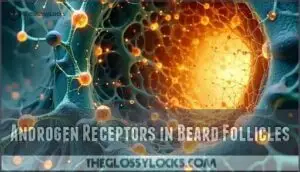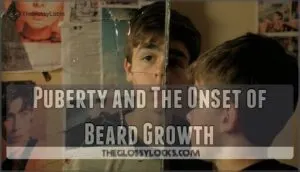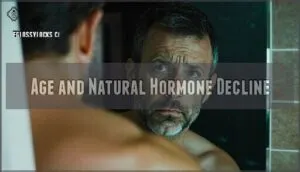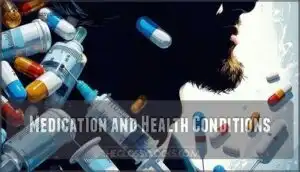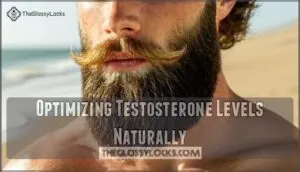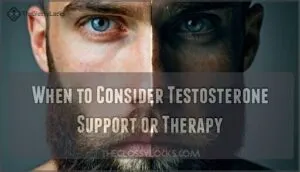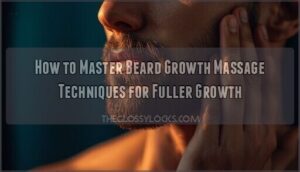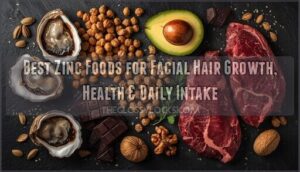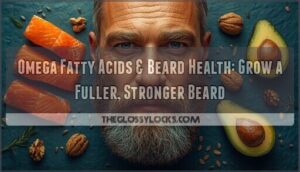This site is supported by our readers. We may earn a commission, at no cost to you, if you purchase through links.
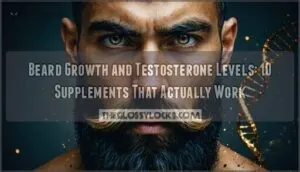
Think of testosterone as the engine oil—more doesn’t always mean a thicker beard, but you need enough to start the growth process.
Genetics handle most of the heavy lifting, setting the pace and style your facial hair takes.
Even if your testosterone is right where it should be, things like age, stress, and diet can throw a wrench in the works.
Stick around—there’s more to achieving that powerful beard than meets the eye.
Table Of Contents
- Key Takeaways
- 10 Best Supplements and Vitamins for Beard Growth
- 1. Alpha Beard Growth Hair Vitamins
- 2. Nutricost Testosterone Support Supplement Capsules
- 3. Everlywell At-Home Testosterone Test for Men
- 4. DHT Blocker Hair Growth Supplement
- 5. Hair and Beard Growth Vitamins
- 6. NutraChamps Beard Vitamins for Men
- 7. Mens Hair Growth Vitamins Supplement
- 8. GAT Sport Testrol Gold Supplement
- 9. Prime Labs Testosterone Booster Supplement
- 10. Saw Palmetto Gummies for Hair Health
- How Testosterone Affects Facial Hair Growth
- Factors Influencing Testosterone and Beard Growth
- Optimizing Testosterone Levels Naturally
- Common Myths About Beards and Testosterone
- When to Consider Testosterone Support or Therapy
- Frequently Asked Questions (FAQs)
- Conclusion
Key Takeaways
- You won’t grow a thicker beard just by boosting testosterone levels; your genetics and follicle sensitivity actually set the pace.
- Stress and poor sleep can tank your testosterone and slow your beard growth even if your genetics are solid.
- Supplements can help if you’re lacking key vitamins or minerals, but they won’t override what your DNA has planned for your beard.
- Consistency with healthy habits—good sleep, regular exercise, and balanced nutrition—gives your beard the best shot at looking fuller.
10 Best Supplements and Vitamins for Beard Growth
You’ll find that choosing the right supplements can substantially boost your beard growth by supporting healthy testosterone levels and providing essential nutrients for hair follicle development.
These ten carefully selected vitamins and supplements target the hormonal and nutritional factors that directly influence facial hair thickness, density, and growth rate.
1. Alpha Beard Growth Hair Vitamins
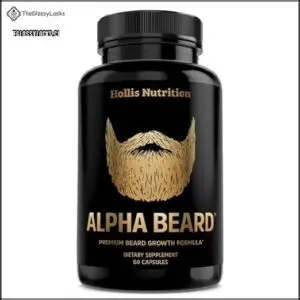
When you’re looking to supercharge your beard game, Alpha Beard Growth Hair Vitamins pack a serious punch with 10,000 mcg of biotin plus a full arsenal of growth-boosting nutrients.
Unlock your beard’s full potential with powerful biotin and next-level nutrients for thicker, fuller growth.
This powerhouse formula combines collagen, keratin, and patented MCT oil technology to deliver nutrients directly to your hair follicles.
You’ll get vitamins A through E, plus zinc and MSM to strengthen your beard from the inside out.
Most guys notice thicker, less patchy growth within 30 days of consistent use.
Best For: Men seeking fuller, thicker beards who want an all-in-one supplement to boost hair growth and support overall hair health.
- Results may vary, especially for those with minimal natural facial hair or certain hormone profiles.
- Some users reported effectiveness changed with capsule color and formula updates.
- Not a quick fix; requires daily use and long-term commitment for best results.
- Delivers high-dose biotin, collagen, and nutrients for thicker, stronger facial hair.
- Reports of noticeable improvement in beard density and reduced patchiness in 30 days.
- Combines 14 key ingredients in easy-to-take, gluten-free capsules.
2. Nutricost Testosterone Support Supplement Capsules
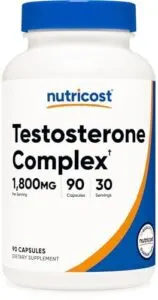
Nutricost’s testosterone support delivers 1,800mg of D-Aspartic Acid per serving, targeting your body’s natural hormone production pathways.
You’ll get 11 active ingredients including zinc, magnesium, and vitamin B6 that support testosterone synthesis.
The formula combines traditional herbs like Tribulus Terrestris with BioPerine for enhanced absorption.
While some users report increased energy and workout performance, results vary substantially. Take three capsules daily with meals for maximum absorption.
This third-party tested supplement offers a thorough approach to hormonal support, though individual responses depend on your baseline testosterone levels.
Best For: Adults seeking a multi-ingredient supplement aimed at supporting natural testosterone levels, particularly those without underlying medical conditions.
- 1,800mg D-Aspartic Acid per serving, plus zinc, magnesium, and vitamin B6
- Non-GMO, gluten-free, third-party tested, and made in a GMP, FDA-registered facility
- Some users experience increased energy, libido, and enhanced workout performance
- Results are inconsistent, especially in healthy individuals; some notice no change
- Potential side effects like stomach discomfort and headaches, often linked to D-Aspartic Acid and blue dye
- No robust clinical trials confirm multi-ingredient effectiveness; long-term safety is unproven
3. Everlywell At-Home Testosterone Test for Men
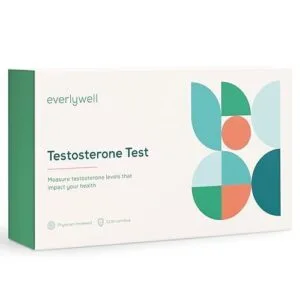
Before diving into supplements, you need to know where your testosterone levels actually stand.
Everlywell’s at-home testosterone test gives you that baseline without the hassle of doctor visits or lab appointments.
This saliva-based test measures your free testosterone levels and delivers results through a secure online platform within days.
While it’s convenient and affordable, remember that saliva tests aren’t as accurate as blood work.
Think of it as your starting point for understanding whether low testosterone might be affecting your beard growth potential.
Best For: Guys who want a quick, private way to check free testosterone from home before committing to doctor visits.
- Easy at-home saliva sample collection with clear instructions.
- Fast and discreet results available online within days.
- Affordable and accepts HSA/FSA payments.
- Not as accurate or comprehensive as blood-based hormone testing.
- Only measures free testosterone, missing total or bioavailable levels.
- No personalized medical guidance included with your results.
4. DHT Blocker Hair Growth Supplement
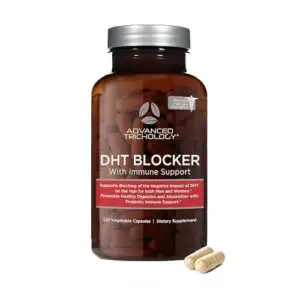
Most people think DHT blockers would hurt beard growth, but this supplement walks a different line.
The DHT Blocker Hair Growth Supplement contains 11 natural ingredients that target pattern hair loss while supporting overall hair health.
You’ll get saw palmetto, biotin, and zinc working together to balance your hormone levels without completely shutting down DHT production.
Users report reduced hair shedding within 1-2 months, though some experience stomach discomfort.
Take four capsules daily with food for best results and hormonal balance.
Best For: Adults dealing with genetic or hormonal hair loss who want a natural, clinically-tested supplement to support hair growth and overall hair health.
- Contains 11 natural ingredients, including saw palmetto, biotin, and zinc, for balanced DHT support.
- Clinically tested with observed reduction in hair shedding within 1-2 months for many users.
- Vegetarian, gluten-free, and produced in compliance with clinical and safety standards.
- Some users experience side effects like stomach discomfort and extended menstrual bleeding.
- Mixed reviews on effectiveness; a few users report increased hair loss.
- Higher price point may be a barrier for long-term use.
5. Hair and Beard Growth Vitamins
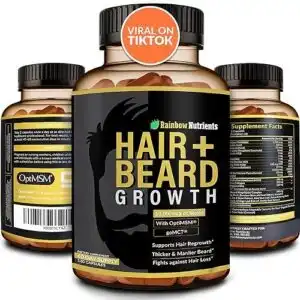
Something remarkable happens when you address nutrient deficiencies that sabotage hair growth—your follicles finally get the fuel they need.
These extensive vitamins pack biotin for keratin production, zinc for hormone regulation, and B-complex vitamins for cellular energy.
You’ll notice gradual improvements over six months, not overnight miracles.
While genetics still rule your beard’s destiny, consistent supplementation helps maximize your potential, giving your follicles premium gasoline instead of regular—better performance takes time, and users report thicker hair and stronger growth, though patience remains essential.
Best For: Men seeking fuller hair and beard with no major side effects, especially those with nutrient deficiencies or gradual thinning.
- Results vary; some may see little to no change and may need to try other brands
- No instant effects—patience and long-term commitment are required
- Supplements cannot overcome genetic limitations in hair or beard growth
- Noticeable improvements in hair and beard thickness after several months of consistent use
- Gentle, well-tolerated formula with high-quality ingredients and no reported discomfort
- Easy addition to daily routines and praised for effectiveness in promoting healthier, denser growth
6. NutraChamps Beard Vitamins for Men
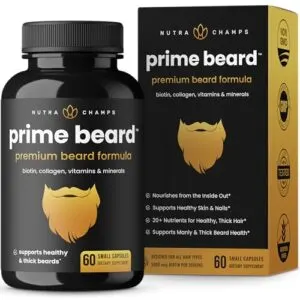
Hair-growth powerhouse NutraChamps Beard Vitamins pack 20 essential nutrients into a thorough formula that targets patchy beards from multiple angles.
You’ll get biotin for keratin production, collagen peptides for hair strength, and saw palmetto to support healthy DHT levels.
The blend includes zinc, vitamin E, and B-complex vitamins that nourish follicles from within.
Users report thicker, fuller beards within four to eight weeks of consistent use.
At a competitive price point with a 365-day guarantee, it’s a solid choice for men wanting measurable results.
Best For: Men looking to boost beard thickness and fill in patchy areas with a daily supplement.
- Not effective for bald spots or areas without hair follicles.
- Mixed results reported, with some users seeing little to no improvement.
- Occasional quality concerns, such as bottles with fewer capsules than advertised.
- Contains 20 essential nutrients targeting beard growth from multiple angles.
- Noticeable results in beard thickness and fullness within 4–8 weeks for many users.
- Allergen-friendly, non-GMO, and backed by a 365-day guarantee.
7. Mens Hair Growth Vitamins Supplement
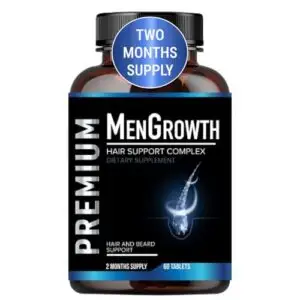
If you’re looking to grab the reins and boost beard growth, Mens Hair Growth Vitamins Supplement offers a targeted mix of vitamins, minerals, and herbal extracts.
With key ingredients like biotin, zinc, saw palmetto, and B-complex, it aims to support thicker facial hair and address hair thinning from every angle.
The formula’s easy-to-swallow tablets mean no wrestling with messy powders or sprays—just take one daily, stick to it for three months, and you might just see your beard gain new ground.
Some men also find success using beard growth supplements to further enhance their facial hair.
Best For: Men experiencing early signs of hair thinning or beard patchiness, especially those seeking a supplement-focused approach.
- Contains a wide range of vitamins, minerals, and herbal DHT blockers to support hair and beard growth.
- Easy, once-daily tablet without aftertaste or stomach upset.
- Positive user feedback emphasizes reduced hair fall and satisfaction with results after consistent use.
- Mixed reviews, with some users not experiencing noticeable results.
- Requires at least three months of consistent use for best results.
- Results vary by individual genetics and may provide no benefit for men without nutritional deficiencies.
8. GAT Sport Testrol Gold Supplement
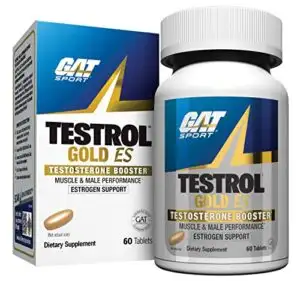
If you’re after a supplement that packs a punch for beard growth, GAT Sport Testrol Gold steps up with a mix of science-backed ingredients.
Think zinc, L-arginine, DIM, and PrimaVie Shilajit, all working to optimize testosterone, support muscle growth, and ramp up energy.
Users frequently note improvements in workout performance and recovery, though a few mention the occasional stomach hiccup.
For best results, stick with consistent use alongside your regular lifting routine, and always check with your doctor before starting.
Best For: Men seeking to boost testosterone, muscle growth, and energy—especially athletes and gym-goers aiming for better workout performance and faster recovery.
- May cause stomach issues for some users.
- Results vary, with some noticing minimal effects on libido or muscle gains.
- Product quantity and packaging consistency could be improved.
- Supports testosterone, muscle growth, and energy for increased workout performance.
- Includes zinc, L-arginine, DIM, and Shilajit—science-backed ingredients for hormone balance.
- Most users report noticeable strength, energy, and recovery improvements within weeks.
9. Prime Labs Testosterone Booster Supplement
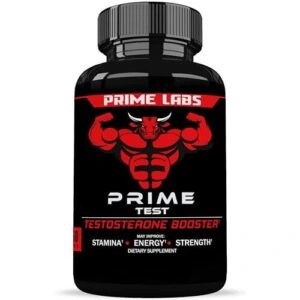
Step up your game with Prime Labs Testosterone Booster, a supplement designed to fire up strength, stamina, and confidence.
It’s got heavy hitters like Tongkat Ali and Horny Goat Weed, but of course, the science behind some ingredients is still cloudy.
Many men over sixty say it gives energy and sharper focus, though actual testosterone results vary.
You’ll want to take two caplets a day and expect patience—results often take a few weeks.
Always check with your doctor, especially if you’ve got health concerns.
Best For: Men over sixty looking to boost energy, stamina, and daily motivation, especially those dealing with low testosterone or prostate concerns.
- Includes ingredients like Tongkat Ali and Boron that may support test levels and energy.
- Positive feedback on increased stamina, focus, and workout performance.
- Made in the USA and third-party tested for purity.
- Dosages for most ingredients are undisclosed, raising transparency concerns.
- Some ingredients lack clinical evidence or have mixed scientific support.
- Possibility of side effects and withdrawal symptoms; results vary widely.
10. Saw Palmetto Gummies for Hair Health
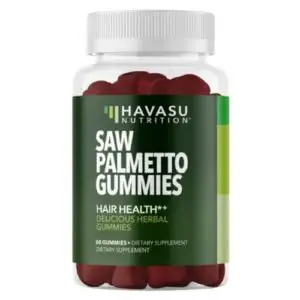
Most guys searching for an easy boost to beard growth eventually encounter Saw Palmetto gummies.
These raspberry-flavored chews work by blocking the enzyme that turns testosterone into DHT, the main culprit behind scalp hair loss and patchy beards.
While clinical evidence is mixed and the 75 mg dose is on the low end, users often report thicker, fuller beards with regular use.
Just remember, consistency is key, and watch the sugar—those three grams add up faster than you might expect, which can impact the overall effectiveness of the Saw Palmetto gummies.
Best For: Men seeking an easy, tasty way to support beard and hair density with a daily vegan supplement.
- Contains 3 grams of added sugar per serving, which may not suit all diets.
- Saw palmetto dose (75 mg) is lower than amounts proven effective in studies.
- Results are mixed and require consistent, long-term use, with some users seeing no change.
- Pleasant raspberry flavor and chewable format make daily use simple.
- May help thicken hair and beards by blocking DHT, based on user feedback.
- Supports prostate and urinary health in men, vegan and gluten-free.
How Testosterone Affects Facial Hair Growth
Testosterone plays a direct role in sparking beard growth, making those stubborn patches a little less mysterious.
You’ll notice your facial hair grows faster and thicker as your testosterone levels rise, though genetics still call most of the shots.
The Role of Testosterone and DHT
After learning about beard-boosting supplements, it’s time to understand how testosterone drives your results.
When testosterone levels climb, your body converts some into dihydrotestosterone (DHT)—think of DHT as your beard’s engine.
DHT potency signals androgen receptors in hair follicles, tweaking beard thickness and growth patterns.
High DHT beard? You’ll notice thicker whiskers and bolder facial hair.
However, genetic sensitivity to DHT plays a vital role in determining beard density.
Androgen Receptors in Beard Follicles
Inside your beard follicles, androgen receptors act like specialized locks waiting for DHT to turn the key.
These receptors show four times higher density in beard areas compared to other hair follicles.
Your genetic blueprint determines receptor sensitivity—some men’s follicles respond aggressively to dihydrotestosterone DHT, while others suffer from androgen insensitivity, limiting hair follicle stimulation regardless of hormone levels.
Androgens influence beard growth through dermal papillae activity.
Effects of Low Vs. High Testosterone
Low testosterone creates patchy, sparse beard growth patterns that leave you frustrated with thin coverage.
Your beard density suffers dramatically when hormone levels drop below 300 ng/dL, signaling testosterone deficiency.
High testosterone fuels robust, thick facial hair that commands respect.
Testosterone supplementation can restore normal beard growth, but addressing the underlying hormone imbalance naturally produces better long-term results for your masculinity, and overall, testosterone plays a crucial role.
Puberty and The Onset of Beard Growth
Your beard’s origin story begins during puberty, typically between ages 12-14, when testosterone levels surge and trigger facial hair growth.
Puberty hormones activate dormant follicle development, transforming fine vellus hairs into coarser terminal hairs through vellus transformation.
This initial growth phase varies substantially due to genetic timing—some guys sprout beards early, while others wait until their twenties for full male development, influenced by genetic timing.
Factors Influencing Testosterone and Beard Growth
Your testosterone levels don’t exist in a vacuum, and several factors beyond genetics can substantially impact your body’s hormone production and, consequently, your beard growth potential.
Understanding these variables, from your age and lifestyle choices to underlying health conditions, helps you identify which areas you can control to optimize your natural testosterone production.
This understanding is crucial as it allows you to make informed decisions about your health and wellbeing, ultimately leading to better management of your hormone production.
Age and Natural Hormone Decline
After 30, your testosterone naturally starts its descent, dropping about 1% each year.
This aging testosterone decline directly impacts follicle responsiveness, causing beard thinning and growth slowdown.
Your once-thick whiskers may become patchy or sparse as hormone levels dip.
Age-related decline affects how your facial hair responds to natural testosterone levels, making maintenance increasingly challenging over time, due to the natural testosterone decline and its impact on beard thinning.
Genetic and Ethnic Variations
Your genetic blueprint holds more sway over beard growth than testosterone alone.
While hormone levels matter, follicle sensitivity and androgen receptors determine how your facial hair responds to DHT levels.
Here’s what genetics controls in your beard destiny:
- Follicle Sensitivity – Your inherited ability to respond to hormones
- Ethnic Density – Middle Eastern men often grow thicker beards than East Asians
- Hereditary Patterns – Family history predicts your beard potential better than blood tests
- Genetic Predisposition – Your DNA sets the ceiling for growth, regardless of supplements
Impact of Obesity and Chronic Stress
Carrying extra weight sabotages your beard growth goals.
Obesity’s Impact includes converting testosterone into estrogen through increased aromatase enzyme activity. Chronic stress elevates cortisol, which directly suppresses testosterone production and creates Hormonal Imbalance.
These Lifestyle Changes matter: losing weight and implementing Stress Reduction techniques can restore testosterone levels.
Your Mental Health affects your facial hair more than you’d think.
Medication and Health Conditions
Several medications and health conditions can sabotage your testosterone levels, directly impacting beard growth.
TRT effects vary based on underlying causes, while hypogonadism impact stems from testicular dysfunction or pituitary disorders affecting hormone production.
- Pituitary disorders and hypothalamic tumors disrupt testosterone regulation, causing sparse facial hair
- Androgen insensitivity prevents follicles from responding to normal testosterone levels despite adequate production
- Medication side-effects from anabolic steroids, corticosteroids, and certain blood pressure drugs lower testosterone
- Hypogonadism from genetic conditions like Klinefelter syndrome severely limits beard development potential
- Testosterone replacement therapy TRT can restore facial hair growth in men with clinically diagnosed hormonal imbalances
Physical Activity and Sedentary Lifestyle
Exercise supercharges your hormone production like nothing else can.
Regular physical activity delivers a powerful testosterone boost, while sedentary lifestyles crush your hormone levels.
The lifestyle impact on overall health extends far beyond the gym.
| Activity Type | Testosterone Effect | Beard Growth Impact |
|---|---|---|
| Weight Training | +15-20% increase | Thicker, faster growth |
| Cardio (moderate) | +10-15% increase | Improved follicle health |
| Sedentary lifestyle | -10-15% decrease | Patchy, slow growth |
| High-intensity training | +20-25% increase | Maximum growth potential |
Optimizing Testosterone Levels Naturally
You can boost your testosterone naturally through strategic lifestyle changes that support your body’s hormone production, which directly impacts your beard growth potential.
Natural optimization methods work by maximizing your brain’s GnRH and LH hormones, which stimulate testosterone production without the risks associated with synthetic alternatives.
Diet and Macronutrient Balance
Your diet directly fuels testosterone production through strategic macronutrient balance.
Proteins impact hormone synthesis when comprising 15-25% of daily calories—too much actually lowers levels.
Fat consumption should emphasize monounsaturated and saturated sources while avoiding polyunsaturated fats.
Carb importance can’t be overstated, requiring 50-70% of calories.
Caloric intake matters too—strict dieting crushes testosterone production completely, which is influenced by overall macronutrient balance.
Key Vitamins and Minerals for Testosterone
Beyond macronutrients, specific vitamins and minerals act as testosterone’s building blocks.
Vitamin D deficiency crushes hormone levels—aim for 2,000-4,000 IU daily.
Zinc benefits include supporting natural production, while magnesium impact reaches 25% testosterone increases in active men.
Selenium effects optimize hormone conversion, and boron influence can boost free testosterone by 28%.
A daily Vitamin D supplement can help maintain adequate levels.
These nutrients transform your body’s hormone-making machinery.
Effects of Sleep and Stress Management
Poor sleep and chronic stress wreak havoc on your testosterone levels, directly impacting beard density and growth rate.
Just five hours of sleep duration can slash testosterone by 15%, while elevated stress hormones like cortisol actively suppress production.
Natural remedies for stress management—meditation, deep breathing, consistent sleep schedules—help optimize your hormone lifestyle and boost testosterone levels naturally.
Role of Exercise and Weight Management
Your body composition directly impacts testosterone production.
Excess body fat increases aromatase enzyme activity, converting testosterone to estrogen and reducing hormone levels available for beard growth.
Here are five key exercise and weight management strategies:
- Resistance training builds muscle mass while boosting testosterone by 15-20%
- High-intensity interval training maximizes fat burning and hormone optimization
- Maintaining 10-15% body fat prevents excessive aromatase conversion
- Compound movements like squats and deadlifts trigger the biggest hormonal response
- Avoiding excessive cardio prevents cortisol spikes that suppress testosterone
Herbs and Natural Supplements
Several herbs can naturally boost testosterone production for enhanced beard growth.
Ashwagandha increases testosterone by 15% in studies, while Mucuna pruriens suppresses cortisol and supports hormone balance.
These herbal testosterone boosters work synergistically with vitamins to address deficiencies that limit natural optimization.
Many men explore herbal beard solutions for growth.
Unlike synthetic options, natural supplements minimize side effects while promoting sustainable testosterone levels and consistent beard growth.
Common Myths About Beards and Testosterone
You’ve probably heard that a thick beard automatically means high testosterone levels, but this widespread belief doesn’t match the scientific evidence.
Many factors beyond testosterone, including genetics, age, and ethnicity, determine your beard’s thickness and growth patterns, making these common assumptions misleading.
Beard Thickness Vs. Testosterone Levels
A thick beard doesn’t automatically signal sky-high testosterone levels.
Your beard thickness depends on multiple factors beyond hormone levels, creating a complex relationship that surprises many men.
- Follicle Sensitivity and Receptor Density: Your hair follicles’ response to testosterone varies based on genetic predisposition
- DHT Conversion Efficiency: How well your body converts testosterone affects beard density more than raw hormone levels
- Age Influence: Testosterone and beard thickness change independently as you mature
Genetics and Hereditary Factors
Your beard genetics trump testosterone levels every time.
No supplement can outmaneuver the genetic blueprint behind your beard.
Family history determines your androgen sensitivity and receptor variability, not your hormone numbers.
If your dad rocks a patchy beard, you’ll likely inherit that genetic predisposition.
Ethnic variations also play huge roles—Mediterranean men typically outgrow Asian men regardless of testosterone.
DHT influence depends entirely on your inherited blueprint.
Your beard genetics and family history are crucial in determining your beard growth, and ethnic variations also play a significant role.
DHT and Baldness Relationship
High DHT levels can trigger both thick facial hair growth and DHT hair loss on your scalp.
This paradox occurs because androgen receptor sensitivity varies between face and head follicles.
Your genetic predisposition determines how 5-alpha reductase converts testosterone to DHT, affecting both beard thickness and potential baldness.
Factors like age and genetics also play a role in hair loss.
Treatment options targeting DHT may reduce both hair loss and facial hair density.
Ethnicity and Beard Density
Among all genetic factors, your ethnic background plays a surprisingly decisive role in beard density.
Middle Eastern and Mediterranean men typically sport thicker facial hair due to higher 5-alpha reductase enzyme levels, while Asian men often have naturally sparser beards despite normal testosterone levels.
Your hereditary patterns and follicle sensitivity matter more than raw hormone numbers.
Perceived Masculinity and Beard Growth
Despite widespread beliefs linking beards and virility, facial hair stereotypes don’t reflect actual testosterone levels.
You can’t judge someone’s hormonal health by their beard thickness alone. Beard cultural significance varies globally, and masculinity redefined means confidence comes from within, not follicle density.
While facial masculinity and sexual attractiveness may correlate with beard growth, perceived masculinity depends on far more than testosterone-driven whiskers.
When to Consider Testosterone Support or Therapy
You should consider testosterone support when you’ve noticed patchy beard growth alongside other symptoms like fatigue, low muscle mass, or decreased libido, especially if you’re over 30 and blood tests confirm levels below 300 ng/dL.
Before jumping into synthetic options, you’ll want to explore natural methods first, since they can boost your body’s own hormone production without the risks that come with testosterone replacement therapy.
Signs of Low Testosterone Affecting Facial Hair
Recognizing low testosterone’s impact on facial hair becomes straightforward when you know what to watch for.
Your beard tells a story about your hormone levels through these telltale signs:
- Patchy beard growth with uneven coverage
- Slow growth despite consistent grooming routines
- Thin hairs that lack thickness and density
- Delayed puberty affecting teenage facial hair development
- Reduced density compared to family members’ beards
Natural Vs. Synthetic Supplementation
When choosing between natural boosters and synthetic testosterone, you’re weighing supplement efficacy against TRT side-effects.
Natural testosterone boost options work gradually without synthetic risks like testicular shrinkage or infertility.
However, beard growth supplements can’t match synthetic testosterone’s immediate impact on testosterone levels.
Consider long-term effects: natural methods preserve your body’s hormonal balance while avoiding dependency issues.
Some supplements include essential nutrients for growth like Biotin, vitamins A and D, which support beard growth and overall health, promoting a hormonal balance and helping to avoid dependency issues.
Hormone Testing and Monitoring
Before diving into testosterone support, you’ll need baseline hormone testing to understand where you stand.
A simple testosterone blood test reveals your current levels, but timing matters—test in the morning when levels peak.
Testing methods include total and free testosterone measurement, with follow-up monitoring every 3-6 months.
Interpreting results requires understanding normal ranges and actionable insights for your specific situation.
Many people find it helpful to purchase a kit for easy at-home testing.
Risks and Benefits of TRT
TRT benefits include increased muscle mass, improved bone density, and enhanced energy levels that can positively impact beard growth.
However, testosterone treatment options come with significant TRT risks you should consider carefully:
- Potential cardiovascular complications and blood clot formation
- Testicular shrinkage and reduced natural hormone production
- Accelerated prostate issues in susceptible individuals
Hormone replacement therapy requires weighing these testosterone side effects against potential gains before starting testosterone administration.
Maintaining Hormonal Balance Long-term
How can you maintain ideal hormone balance without becoming dependent on supplements?
Natural optimization beats synthetic shortcuts every time. Focus on consistent sleep, balanced nutrition, and regular exercise to support your body’s testosterone production long-term.
| Natural Strategies | Synthetic Dependency |
|---|---|
| Sustained beard growth | Temporary results |
| Hormonal balance maintained | Disrupted natural production |
| Long-term health benefits | Potential side effects |
Smart hormonal factors management keeps your testosterone levels stable naturally.
Frequently Asked Questions (FAQs)
How does shaving affect future beard thickness?
Shaving won’t make your beard thicker or fuller—no matter how often you reach for the razor.
Hair might look rougher after shaving, but that’s just an illusion.
Your genetics and hormones call the shots, not your grooming habits.
Are there environmental factors that slow beard growth?
Get this—just five hours of sleep a night can drop your testosterone by 15%.
If you’re pulling all-nighters or stressing nonstop, your beard may struggle to grow.
Skip the late-night hustle, your hair will thank you.
Conclusion
Like the roots of a tree shaping every branch, beard growth and testosterone levels work together in ways you can actually influence.
You’ve learned that supplements, lifestyle choices, genetics, and hormonal balance all play a role.
While you may not get a lumberjack beard overnight, smart steps—ranging from targeted vitamins to better sleep—help tip the scale.
If you’re aiming for a mighty beard, remember: science, patience, and consistency lay the foundation for noticeable results.
- https://thebeardclub.com/blogs/beard-culture/discover-beard-genetics
- https://pmc.ncbi.nlm.nih.gov/articles/PMC5928870/
- https://hrtdoctorsgroup.com/the-link-between-low-testosterone-and-patchy-facial-hair-solutions-for-improved-growth/
- https://www.brio4life.com/blogs/mens-grooming/beard-growth-stages
- https://www.folxhealth.com/library/how-testosterone-impacts-hair-growth-and-loss-facial-body-and-more


